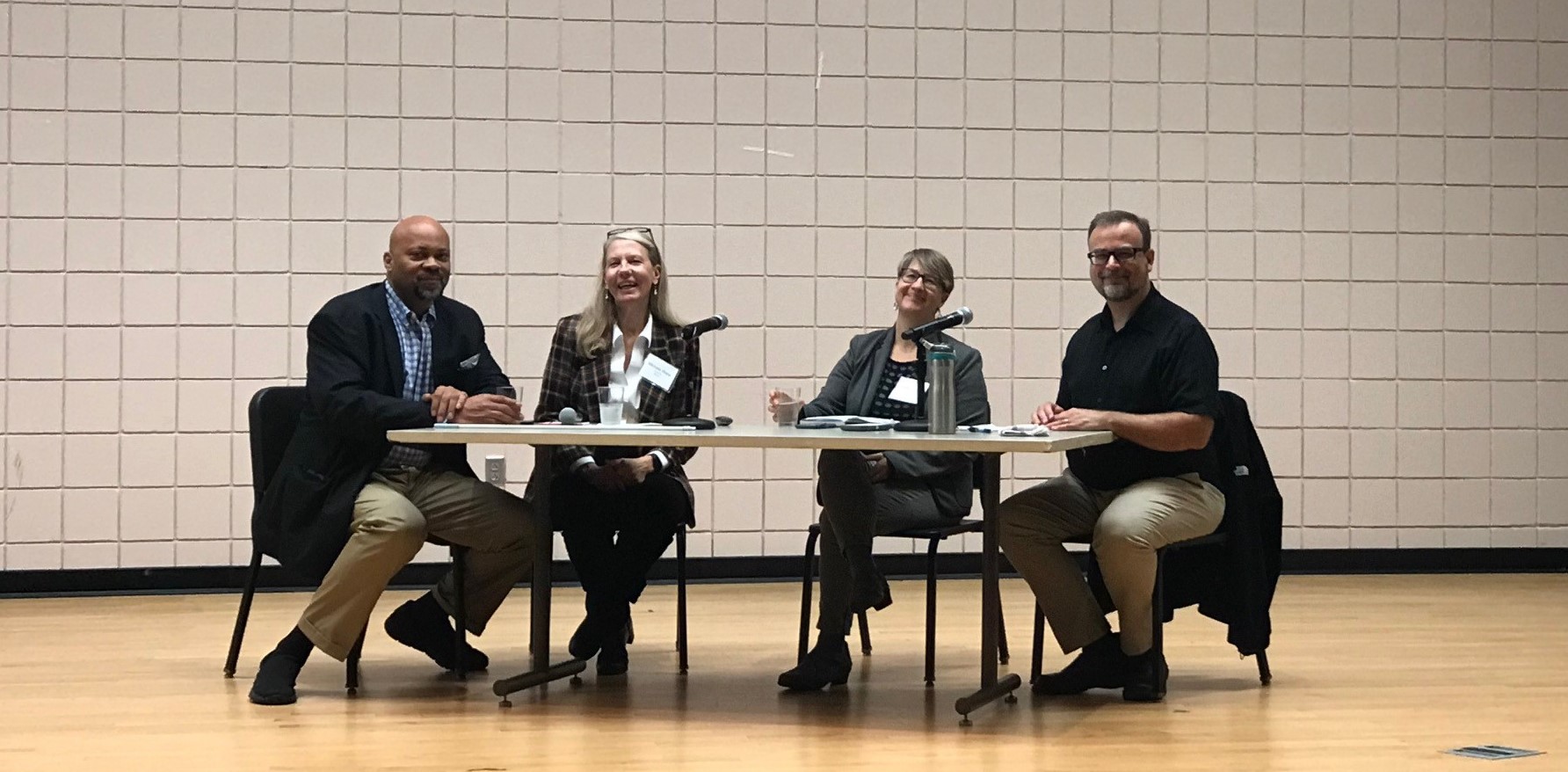NCCU professors at the Triangle Digital Humanities Institute, from left to right: Brett Chambers, Michele Ware, Collie Fulford, and Matthew Cook
by Stuart Parrish
The October 24-25 Triangle Digital Humanities Institute met at North Carolina Central University under the theme “Representation Matters.” The Institute was launched by keynote speaker marilyn m. thomas-houston’s address entitled “Representations Matter: Intersections of Digital Technology and Black Experiences.” In a previous article, I shared from an interview with thomas-houston that provided me with an orientation of sorts. This was my first academic conference where I had been privy to the weekly planning meetings held by faculty of the school, coordinated by Dr. Michele Ware, as well as weekly meetings with Web and Co-Communications Manager Claire Cahoon. By virtue of some familiarity with these three integral parts of the institute, my experience was deepened in ways this article will reflect. Although I represented myself to them as a student and an intern, I was welcomed by each with a far more egalitarian approach than I expected. I was surprised by how gracious they were with their time, and willingness to answer questions, explaining the many concepts new to me.
The theme of representation mattering, or matters of representation, now had important personal aspects of agency, inclusion, and familiarity. I was only an undergraduate previously unfamiliar with the wide variety of topics digital humanities encompasses, but I brought with me the feeling that I now belonged in this group. Going forward now that the intensive networking, planning, and preparation is past, I would highly recommend an internship with TDHN as an open door to a world of post-graduate level discourse and community which rewards the hours spent performing tasks within the grasp of an undergraduate. Extending a metaphor used by both Drs. Ware and thomas-houston, it means a lot to be invited to sit at the table. The diversity of the groups of people presenting, taking part in faculty planning committee meetings, and interviewing Dr. thomas-houston made me reflect on representational justice. This and my work meetings with my internship supervisor at UNC Chapel Hill all placed me in a position of heightened receptiveness. I had an air of confidence and security strengthened by knowing that I would see and know their faces, and that we would not be at a loss for words in greeting one another. When I sat in the auditorium to hear Dr. thomas-houston speak, I would feel I had been graciously welcomed before the first word was spoken. Have you ever heard an engaging speaker begin with a thanks to the person who gave them a ride from the airport or met them for dinner the night before and felt a little envy, wishing you could have been there?
It was a wise and fortunate choice to end my Institute experience by sitting down with Dr. Ware on Monday, November 4, in her office after the last class of the day. Enough time had passed to let the confusing swirl of ideas settle. I had written thousands of words which did not fit into this article, but became part of my research journal entries and future articles on the many presentations and topics from those two days. She began by sharing a letter of appreciation she had penned to Dean Wilson, recognizing his commitment to representational justice, and thanking him for taking the time to introduce Dr. thomas-houston as well as providing financial support. She wanted me, and others, to know how important it was to know the Dean of the College of Arts and Sciences made the Institute a visible priority. Our Dean is himself a scholar, and his heart is in the work shared by the faculty.
Dr. Ware went on to explain how in her time at UNC pursuing her Masters and Ph.D. she had learned of the Triangle Research Libraries Network, and the enormous value of a network which afforded the resources of the combined holdings of libraries at UNC, Duke, NCSU and NCCU in her work leading to those degrees. She learned that TRLN wanted to be represented/included in a show of support for the Institute, and had provided financial means to cover food and beverages for both days. Dr. Ware is also a Fellow of the Franklin Institute, a Duke/NCCU partnership. Duke University and the Franklin Institute were supportive as well, providing the major portion needed for honorarium for our keynote. Dr. Ware also shared a letter to colleague Brett Chambers, who had used his community connections to support bringing in a featured workshop presenter, Susan Mango Curtis of Adobe Outreach, in addition to leading his own presentation to wrap up the Institute on International Digital Humanities Exchange. So many offerings of such a variety of topical natures, and a thank you to the broad support of the community, not least of which the Triangle Digital Humanities Network itself. After reflecting on the Institute, Dr. Ware shines a bright smile, laughing a little, “We represented well!”

